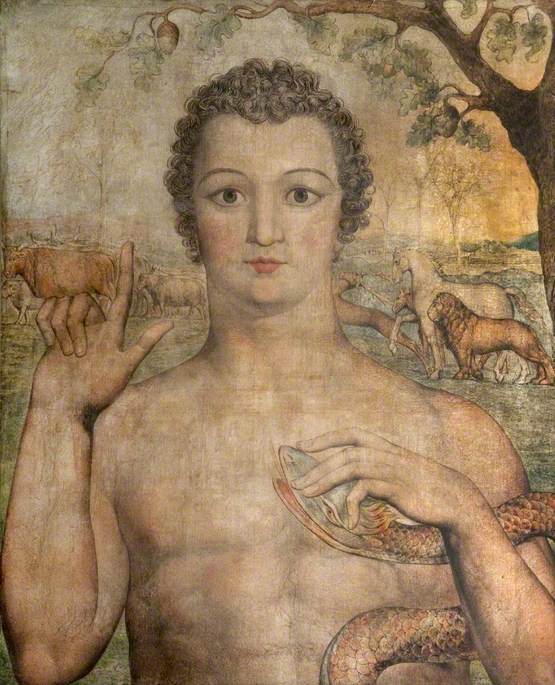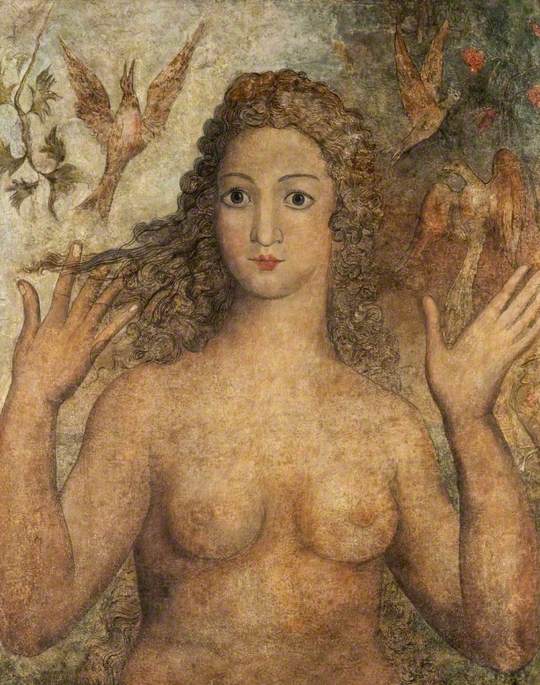Blake became acquainted with Henry Crabb Robinson though John
Linnell. Blake was invited to the home of Mr. and Mrs. Aders with
Linnell and met there the journalist and lawyer Robinson, whose
hobby was interviewing the Romantic poets among others. The records
of conversations Robinson held with Blake late in his life, show
Blake to be a feisty and alert man with little tolerance for being
misunderstood by someone without spiritual discernment. In spite of
his interest in Romanticism, Robinson admitted that the parts of
'Wordworth's ode which he [Blake] most enjoyed were the most obscure
and those I the least like and comprehend.' His comprehension of
Blake's remarks also was limited which he attributed to Blake's
repetition.
In wikisource we find EXTRACTS FROM THE DIARY, LETTERS, AND REMINISCENCES OF HENRY CRABB ROBINSON.
Henry Crabb Robinson wrote in February 1826:
"I spoke again of the form of the persons who appear to him. Asked why he did not draw them, 'It is not worth while. There are so many, the labour would be too great. Besides there would be no use. As to Shakespeare, he is exactly like the old engraving—which is called a bad one. I think it very good.'
I enquired about his writings. 'I have written more than Voltaire or Rousseau—six or seven epic poems as long as Homer, and 20 tragedies as long as Macbeth.' He showed me his Vision (for so it may be called) of Genesis—'as understood by a Christian Visionary,' in which in a style resembling the Bible the spirit is given. He read a passage at random. It was striking. He will not print any more. 'I write,' he says, 'when commanded by the spirits, and the moment I have written I see the words fly about the room in all directions. It is then published, and the spirits can read. My MSS. of no further use. I have been tempted to burn my MSS., but my wife won't let me.' She is right, said I—and you have written these, not from yourself, but by a higher order. The MSS. are theirs and your property. You cannot tell what purpose they may answer unforeseen to you. He liked this, and said he would not destroy them. His philosophy he repeated—denying causation, asserting everything to be the work of God or the Devil—that there is a constant falling off from God—angels becoming devils. Every man has a devil in him, and the conflict is eternal between a man's self and God, etc. etc. etc. He told me my copy of his songs would be 5 guineas, and was pleased by my manner of receiving this information. He spoke of his horror of money—of his turning pale when money had been offered him, etc. etc. etc."
Robinson and Blake were at cross purposes in their conversations: as
usual Blake wanted to open the mind of his acquaintance to the
perception of the infinite; Robinson, as the type of the natural
man, attempted to reduce the higher dimension to something which
could be grasped by the lower.
When Jesus spoke of the necessity of being born again, he was addressing a similar situation. Unless a man experiences a transformation of his ability to perceive, he is unable to recognize the dimension of the spirit. The natural man is blinded to the spirit by habitually trusting only in his senses and limited reasoning power of his circumscribed brain. The breaking down of the pattern of denying the messages that well up in his own heart and soul, is an expression the death that precedes rebirth. If we like Blake would like:
In wikisource we find EXTRACTS FROM THE DIARY, LETTERS, AND REMINISCENCES OF HENRY CRABB ROBINSON.
Henry Crabb Robinson wrote in February 1826:
"I spoke again of the form of the persons who appear to him. Asked why he did not draw them, 'It is not worth while. There are so many, the labour would be too great. Besides there would be no use. As to Shakespeare, he is exactly like the old engraving—which is called a bad one. I think it very good.'
I enquired about his writings. 'I have written more than Voltaire or Rousseau—six or seven epic poems as long as Homer, and 20 tragedies as long as Macbeth.' He showed me his Vision (for so it may be called) of Genesis—'as understood by a Christian Visionary,' in which in a style resembling the Bible the spirit is given. He read a passage at random. It was striking. He will not print any more. 'I write,' he says, 'when commanded by the spirits, and the moment I have written I see the words fly about the room in all directions. It is then published, and the spirits can read. My MSS. of no further use. I have been tempted to burn my MSS., but my wife won't let me.' She is right, said I—and you have written these, not from yourself, but by a higher order. The MSS. are theirs and your property. You cannot tell what purpose they may answer unforeseen to you. He liked this, and said he would not destroy them. His philosophy he repeated—denying causation, asserting everything to be the work of God or the Devil—that there is a constant falling off from God—angels becoming devils. Every man has a devil in him, and the conflict is eternal between a man's self and God, etc. etc. etc. He told me my copy of his songs would be 5 guineas, and was pleased by my manner of receiving this information. He spoke of his horror of money—of his turning pale when money had been offered him, etc. etc. etc."
| British Museum Illustrations to Young's Night Thoughts |
When Jesus spoke of the necessity of being born again, he was addressing a similar situation. Unless a man experiences a transformation of his ability to perceive, he is unable to recognize the dimension of the spirit. The natural man is blinded to the spirit by habitually trusting only in his senses and limited reasoning power of his circumscribed brain. The breaking down of the pattern of denying the messages that well up in his own heart and soul, is an expression the death that precedes rebirth. If we like Blake would like:
"To see a World in a Grain of Sand
And a Heaven in a Wild Flower
Hold Infinity in the palm of your hand
And Eternity in an hour",
Auguries of Innocence, (E 490),
we must seek to be born to the higher consciousness of Infinity and Eternity.
John 3[1] Now there was a man of the Pharisees, named Nicode'mus, a ruler of the Jews.
[2] This man came to Jesus by night and said to him, "Rabbi, we know that you are a teacher come from God; for no one can do these signs that you do, unless God is with him."
[3] Jesus answered him, "Truly, truly, I say to you, unless one is born anew, he cannot see the kingdom of God."
[4] Nicode'mus said to him, "How can a man be born when he is old? Can he enter a second time into his mother's womb and be born?"
[5] Jesus answered, "Truly, truly, I say to you, unless one is born of water and the Spirit, he cannot enter the kingdom of God.
[6] That which is born of the flesh is flesh, and that which is born of the Spirit is spirit.
[7] Do not marvel that I said to you, `You must be born anew.'
[8] The wind blows where it wills, and you hear the sound of it, but you do not know whence it comes or whither it goes; so it is with every one who is born of the Spirit."
.





